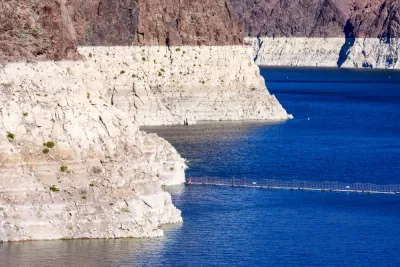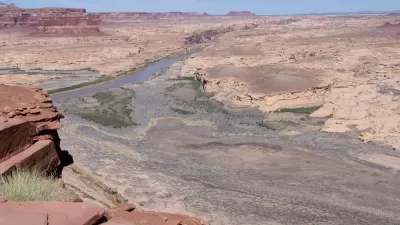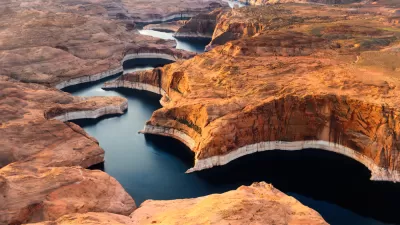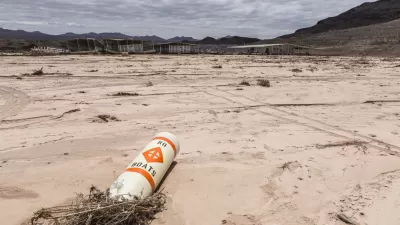The states that rely on the Colorado’s water must make drastic cuts in water usage to maintain use of the West’s most important—and most threatened—water source.

In a conversation with journalist Abrahm Lustgarten, NPR’s Dave Davies examines the worsening water crisis on the Colorado River and the difficult choices faced by residents and officials in the seven states affected. As Lustgarten explains, there is “a palpable sense of emergency when you visit those places.”
Lustgarten describes the as-yet-unsuccessful attempt by the states to come to an agreement on water conservation goals and strategies. “But in order to reach an agreement for how we share the Colorado River going forward, the states will probably need to abandon everything that they've held to in the past about how they use that water, about which industries are supported by it and how cities are grown by it,” Lustgarten asserts, going on to explain the complex nature of water rights in the American West.
According to Lustgarten, “Part of the water law that's pervasive across the West and especially in the upper basin, which includes Colorado, is a stipulation that your water rights are protected so long as you use them. And if you don't use them, then they could be jeopardized.” This has led to landowners sometimes wasting water to protect their long-term rights. Meanwhile, states have shown “an unwillingness to respond with the sense of urgency and at the scale that all of that data and science suggest is needed,” even as drastically low water levels threaten electricity production at the river’s major dams.
FULL STORY: The Colorado River water shortage is forcing tough choices in 7 states

Alabama: Trump Terminates Settlements for Black Communities Harmed By Raw Sewage
Trump deemed the landmark civil rights agreement “illegal DEI and environmental justice policy.”

Study: Maui’s Plan to Convert Vacation Rentals to Long-Term Housing Could Cause Nearly $1 Billion Economic Loss
The plan would reduce visitor accommodation by 25% resulting in 1,900 jobs lost.

Planetizen Federal Action Tracker
A weekly monitor of how Trump’s orders and actions are impacting planners and planning in America.

Wind Energy on the Rise Despite Federal Policy Reversal
The Trump administration is revoking federal support for renewable energy, but demand for new projects continues unabated.

Passengers Flock to Caltrain After Electrification
The new electric trains are running faster and more reliably, leading to strong ridership growth on the Bay Area rail system.

Texas Churches Rally Behind ‘Yes in God’s Back Yard’ Legislation
Religious leaders want the state to reduce zoning regulations to streamline leasing church-owned land to housing developers.
Urban Design for Planners 1: Software Tools
This six-course series explores essential urban design concepts using open source software and equips planners with the tools they need to participate fully in the urban design process.
Planning for Universal Design
Learn the tools for implementing Universal Design in planning regulations.
Caltrans
Smith Gee Studio
Institute for Housing and Urban Development Studies (IHS)
City of Grandview
Harvard GSD Executive Education
Toledo-Lucas County Plan Commissions
Salt Lake City
NYU Wagner Graduate School of Public Service





























